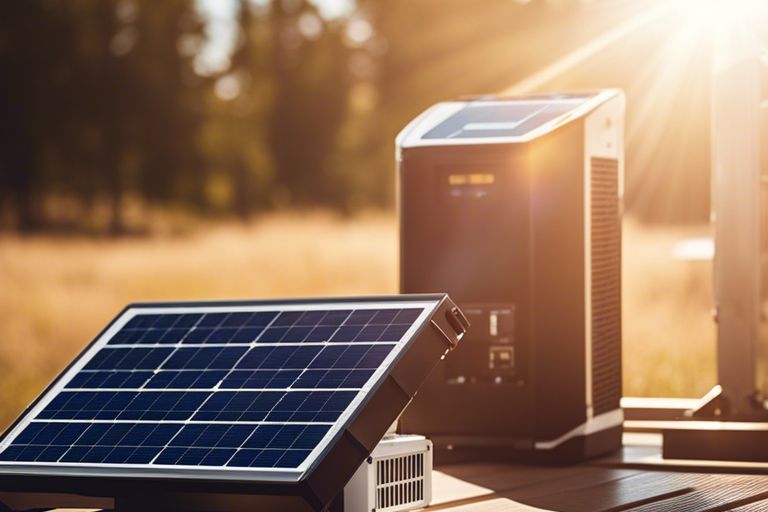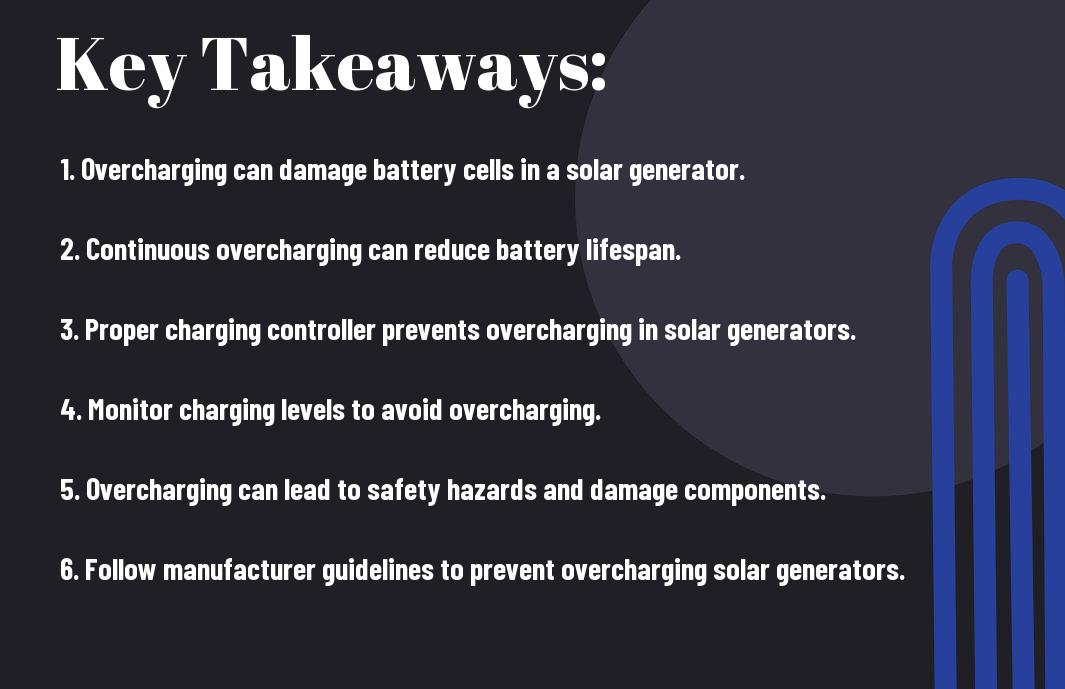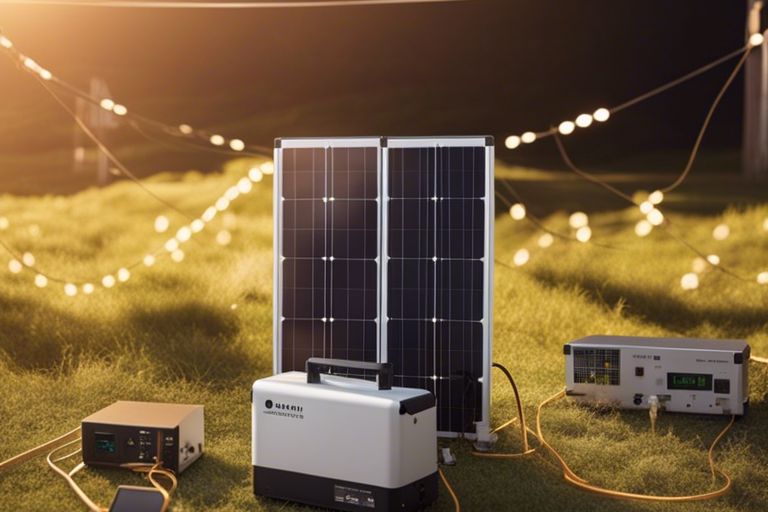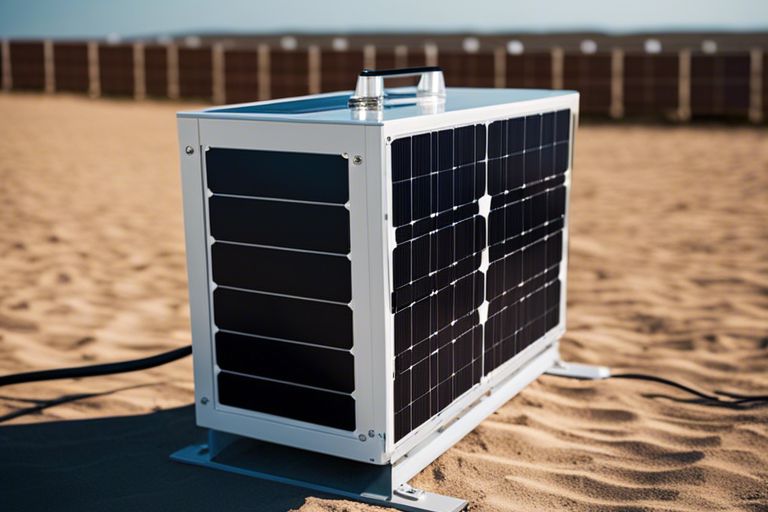Many are intrigued by the concept of solar generators, but do you know if you can overcharge them? Let’s investigate into the science behind solar generators and explore the possibility of overcharging your device. As you continue reading, you will gain a better understanding of how to properly care for and maintain your solar generator to ensure its longevity and efficiency.
Key Takeaways:
- Overcharging Risk: Overcharging a solar generator can damage the battery and reduce its lifespan.
- BMS Protection: Good quality solar generators are equipped with a Battery Management System (BMS) that helps protect against overcharging.
- Monitoring is important: It is important to monitor the charging process to prevent overcharging by disconnecting the generator when fully charged.
- Follow Manufacturer’s Guidelines: Always follow the manufacturer’s guidelines for charging and operating the solar generator to avoid overcharging.
- Proper Maintenance: Regular maintenance and care, such as keeping the solar panels clean and avoiding extreme temperatures, can help prevent overcharging issues.
What is Overcharging?
A solar generator is a convenient and eco-friendly way to power your devices, but it’s necessary to understand the potential risks associated with overcharging. Overcharging occurs when you continue to provide electricity to a battery that is already fully charged. This can happen if you leave your solar generator plugged in for an extended period or if there is a malfunction in the charging system.
Definition of Overcharging
On a technical level, overcharging a battery can lead to an increase in temperature and pressure within the battery cells. This can cause damage to the internal components, reduce the battery’s lifespan, and even pose a safety hazard. It’s crucial to avoid overcharging to ensure the longevity and efficiency of your solar generator.
Consequences of Overcharging
An overcharged battery can suffer from decreased performance and capacity over time. The excess energy causes chemical reactions within the battery that can lead to corrosion and a buildup of gas. In severe cases, overcharging can result in the battery catching fire or exploding, posing a serious risk to your safety and property.
What you need to remember is that overcharging is a preventable issue with proper monitoring and maintenance of your solar generator. By following manufacturer guidelines and being mindful of charging times, you can avoid the damaging effects of overcharging and keep your solar generator working efficiently for years to come.
How Solar Generators Work
Some of the most efficient solar generators work by harnessing the power of the sun through photovoltaic panels. These panels contain cells made of semiconductor materials like silicon that convert sunlight into electricity through the photovoltaic effect.
Principles of Solar Energy Harvesting
One fundamental principle of solar energy harvesting is the conversion of sunlight into electrical energy through the use of photovoltaic cells. These cells generate direct current (DC) electricity when exposed to sunlight, which is then converted into alternating current (AC) electricity using an inverter for use in your home or to charge the generator’s batteries.
Battery Charging and Discharging Cycles
Harvesting energy from the sun not only powers your devices in real-time but also charges the generator’s internal batteries for use when sunlight is not available. The battery charging and discharging cycles are carefully managed by the generator’s built-in charge controller to ensure optimal performance and longevity of the batteries.
Can You Overcharge a Solar Generator?
Theoretical Possibility of Overcharging
Once again, you may wonder if it is possible to overcharge a solar generator. In theory, overcharging can occur when the voltage and current supplied to the battery exceed its capacity to store energy, leading to potential damage or reduced lifespan.
Real-World Scenarios and Limitations
Overcharging a solar generator is less of a concern due to built-in mechanisms like charge controllers that regulate the flow of energy to the battery. These controllers help prevent overcharging by monitoring the battery’s state of charge and cutting off the power supply when it reaches full capacity.
It is vital to follow the manufacturer’s guidelines on charging and maintenance to ensure the longevity and efficiency of your solar generator. By understanding and adhering to the recommended practices, you can maximize the performance of your system while minimizing the risk of overcharging.
Factors Affecting Overcharging Risk
Unlike traditional generators, solar generators are designed with various safeguards to prevent overcharging. However, several factors can affect the risk of overcharging. Here are some key considerations:
Battery Type and Capacity
Affecting the risk of overcharging is the type and capacity of the battery in your solar generator. Different battery chemistries have varying tolerance levels for overcharging. Lead-acid batteries, for example, are more resilient to overcharging compared to lithium-ion batteries. Additionally, the capacity of the battery plays a crucial role. A larger capacity battery can handle a higher charge without being damaged.
Charging Controller and Algorithm
Capacity affecting the risk of overcharging is the type of charging controller and algorithm used in your solar generator. These components regulate the flow of electricity from the solar panels to the battery. An advanced charging controller with smart algorithms can optimize the charging process and minimize the risk of overcharging. The efficiency of the controller and algorithm in balancing the charge rate with the battery’s capacity is imperative in preventing overcharging.
It is crucial to invest in a solar generator with a high-quality charging controller and algorithm to ensure the safe and efficient charging of your battery.
Environmental Factors (Temperature, Humidity)
To prevent overcharging, environmental factors such as temperature and humidity must be taken into account. Extreme temperatures can affect the battery’s performance and increase the risk of overcharging. High humidity levels can also impact the efficiency of the charging process.
| Temperature | Humidity |
| Extreme temperatures can affect battery performance. | High humidity levels can impact charging efficiency. |
This highlights the importance of monitoring and controlling the environmental conditions when using a solar generator to minimize the risk of overcharging.
Overcharging a solar generator can have detrimental effects on its performance and lifespan. By considering these factors and taking appropriate precautions, you can ensure the safe and efficient operation of your solar generator.
Signs of Overcharging
Visual Indicators (LED Lights, Display)
For Can you overcharge a battery with a solar panel?, one of the most common signs of overcharging in a solar generator is the visual indicators, such as LED lights or display readings. If you notice that the battery is constantly showing a full charge or the voltage levels are unusually high, it could be a sign that your generator is being overcharged. This can lead to long-term damage to the battery if not addressed promptly.
Performance Degradation
Degradation can occur in the performance of your solar generator if it is being overcharged. If you start to notice a decrease in the overall efficiency of the generator, such as it not holding a charge for as long as it used to or not powering devices as effectively, this could be an indication of overcharging.
The performance degradation caused by overcharging can significantly impact the usability and lifespan of your solar generator. It is necessary to monitor the performance regularly to ensure that it is functioning optimally.
Unusual Sounds or Smells
Sounds emitting from your solar generator, such as overheating or fizzling noises, can indicate overcharging. Similarly, unusual smells like burning or melting plastic can also be signs of overcharging. If you detect these sounds or smells, it is crucial to investigate the issue promptly to prevent any further damage to your solar generator.
It’s important to address any unusual sounds or smells coming from your solar generator immediately to avoid potential safety hazards or permanent damage to the system. Ignoring these signs could lead to costly repairs or even the need for a replacement generator.
Preventing Overcharging
For a comprehensive guide on preventing overcharging in your solar generator, you can refer to the article on the Risk of solar panel overcharging 12v battery?. Proper installation and configuration are crucial steps to ensure that your solar generator operates efficiently without the risk of overcharging the battery.
Proper Installation and Configuration
An important aspect of preventing overcharging in your solar generator is to ensure proper installation and configuration of the system. Make sure that the solar panels are correctly connected to the battery and charge controller according to the manufacturer’s instructions. Proper configuration of the charge controller settings based on the type of battery being used is also vital to prevent overcharging.
Regular Maintenance and Monitoring
Any solar generator requires regular maintenance and monitoring to prevent overcharging. Inspect the system periodically for any signs of wear and tear, and ensure that all connections are secure. Monitoring the battery voltage levels and charging status regularly can help you detect any potential issues before overcharging occurs.
Preventing overcharging in your solar generator is crucial to ensure the longevity and efficiency of your system. Using built-in protection features such as overcharge protection in the charge controller can help prevent overcharging incidents.
Using Built-in Protection Features
Proper utilization of the built-in protection features in your solar generator, such as overcharge protection in the charge controller, is vital in preventing overcharging. These features are designed to automatically regulate the charging process and prevent the battery from reaching full capacity, thus reducing the risk of overcharging and damage to the battery.
Plus, regular testing of these features to ensure they are functioning correctly is important to guarantee the effectiveness of the built-in protection mechanisms in preventing overcharging in your solar generator.
To wrap up
Upon reflecting on the question “Can you overcharge a solar generator?”, it is crucial to understand the importance of properly managing the charging process to avoid potential damage to your equipment. Be mindful of, it is always best to follow the manufacturer’s guidelines and recommendations to ensure the longevity and efficiency of your solar generator. By being mindful of how you charge your solar generator, you can harness the power of the sun responsibly and effectively.
FAQ
Q: Can you overcharge a solar generator?
A: Overcharging a solar generator can lead to damage to the batteries or the entire system. It is important to use a charge controller to prevent overcharging by regulating the flow of electricity from the solar panels to the batteries.
Q: What are the risks of overcharging a solar generator?
A: Overcharging a solar generator can cause the batteries to overheat, reduce their lifespan, and potentially lead to battery failure. This can result in costly repairs or replacement of the solar generator system.
Q: How can I prevent overcharging of a solar generator?
A: To prevent overcharging of a solar generator, use a reliable charge controller that is properly sized for your system. Charge controllers help regulate the charging process, ensuring that the batteries receive the right amount of electricity without being overcharged.



